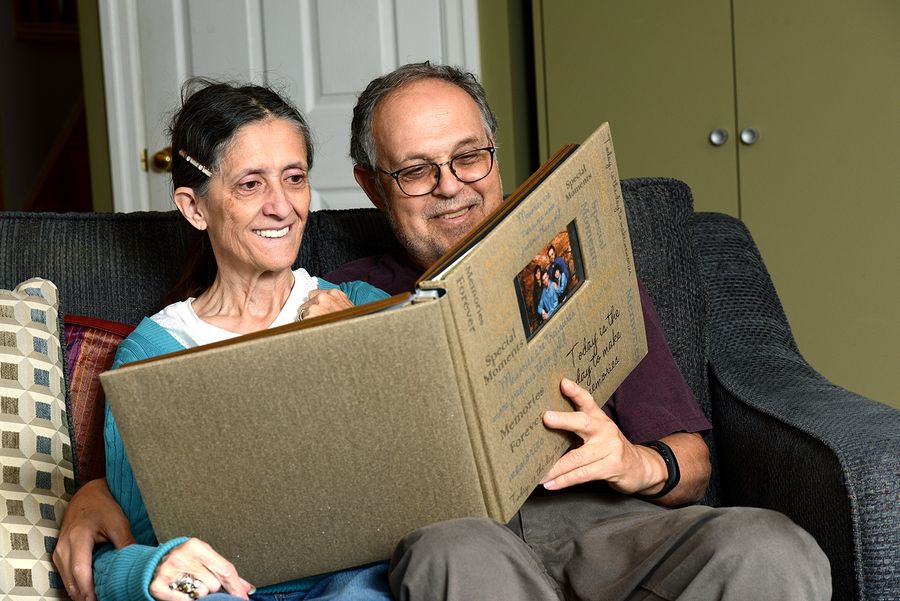BrainsCAN partnership aims to showcase impact of dementia support

Tony and Susan Paul at their home in London, Ontario. Photo supplied by Alzheimer Society London and Middlesex.
Tony Paul and his wife Susan were teenagers when they met in London. Now married 45 years, they have raised two children and are proud grandparents. Like many couples, they were looking forward to retirement. But two years before Tony was set to retire, Susan was diagnosed with Alzheimer’s disease.
“After a while you suspect all kinds of things, and Alzheimer’s was certainly in there. But it’s still a shock when you get the official diagnosis,” said Tony, who is Susan’s primary care partner. “You go through your whole life making plans for what you’re going to do when you finally have time and suddenly, you have to rewrite your whole existence.”
The Alzheimer Society London and Middlesex knows the Paul’s story all too well. Over the last year, the organization has supported more than 2,700 care partners and people living with dementia. For those experiencing the disease, the Alzheimer Society’s programs and services provide a valuable resource for a journey down an unpredictable path.
“Our staff provide emotional support, essential information, and assistance with caring for someone with dementia,” said Carol Walters, CEO of the Alzheimer Society London and Middlesex. “We know the impact our programs and services have on those experiencing dementia, but establishing quantifiable evidence of this impact is not a simple process.”
That’s where BrainsCAN stepped in.
Since 2016, Western’s cognitive neuroscience research initiative has supported Western researchers in the hopes of transforming how brain diseases are understood, diagnosed and treated. A large part of that work is providing support to a variety of research, including studies aimed to assist those living with dementia.
“Brain diseases and disorders are significant health crises, so working collaboratively to lessen the impact of neurodegenerative conditions is really important,” said Fay Harrison, Executive Director for BrainsCAN. “We see our role as not only supporting high-impact brain research, but also connecting with organizations in the community like the Alzheimer Society to help them with their work.”
In 2018, the Alzheimer Society London and Middlesex and BrainsCAN first developed a pilot project to analyze the society’s existing client survey. The final results revealed that the society’s services were a lifeline for its clients yet more could be done to assist the organization in delivering those services to people living in London and Middlesex.
Highlights from the 2018 Alzheimer Society London and Middlesex survey:
- 80.6% of those surveyed reported that the Alzheimer Society helped them better advocate for themselves, 76.8% for their supported partner and 57% reported both.
- 4 out of every 5 of those surveyed reported that the Alzheimer Society helped them in a time of need, and 2 out of every 3 respondents reported that the Alzheimer Society helped them avoid a crisis.
This year, those findings led to a formal partnership with BrainsCAN, the Alzheimer Society London and Middlesex, and the Alzheimer Society of Ontario to bring BrainsCAN’s analytical survey method to six Alzheimer societies in southwestern Ontario.
“Currently in Ontario, there are over 240,000 Ontarians living with dementia and that number is expected to double in the next 20 years,” said Christina Stergiou-Dayment, First Link® Program Director for the Alzheimer Society of Ontario.
“The partnership with BrainsCAN helps us maximize the learnings from client feedback, which is especially important to understand and communicate the impact of our local Societies across Ontario at both client and system levels. This enables us to enhance and grow our education and support programs and services to continue to contribute to improved quality of life for those affected by Alzheimer’s disease and related dementias.”
BrainsCAN’s analytical survey was distributed to Alzheimer Society clients over the summer. More than 500 care partners and those with dementia in southwestern Ontario completed the survey. BrainsCAN will analyze the data this fall, culminating in a formal report in early 2020.
“Partnerships are essential to reducing the impact of dementia,” said Walters. “Families experiencing a dementia journey face many challenges. Helping them through these challenges is essential to ensuring they live well with the disease.”
For Tony, he knows the Alzheimer Society London and Middlesex has made an impact on his and Susan’s life.
“The Alzheimer Society is one place we can go where people know what we’re going through,” said Tony. “Susan is at a stage now where I don’t think she’d be at home if it hadn’t been for our experience with the Alzheimer Society. It’s given us a little more time together.”
BrainsCAN is funded by the Government of Canada's Canada First Research Excellence Fund (CFREF).
For more information about World Alzheimer’s Month, please see https://www.worldalzmonth.org/.






